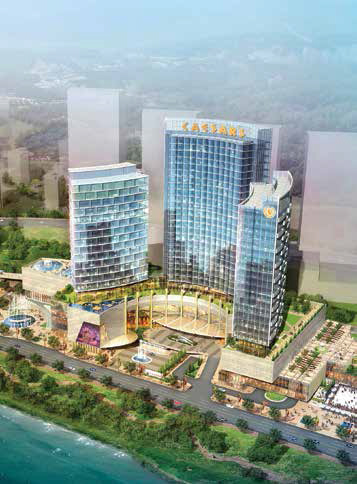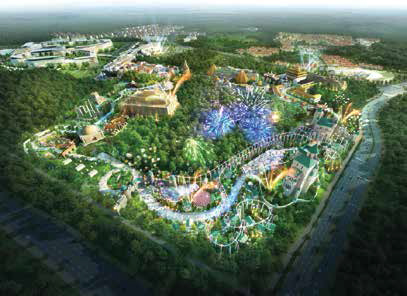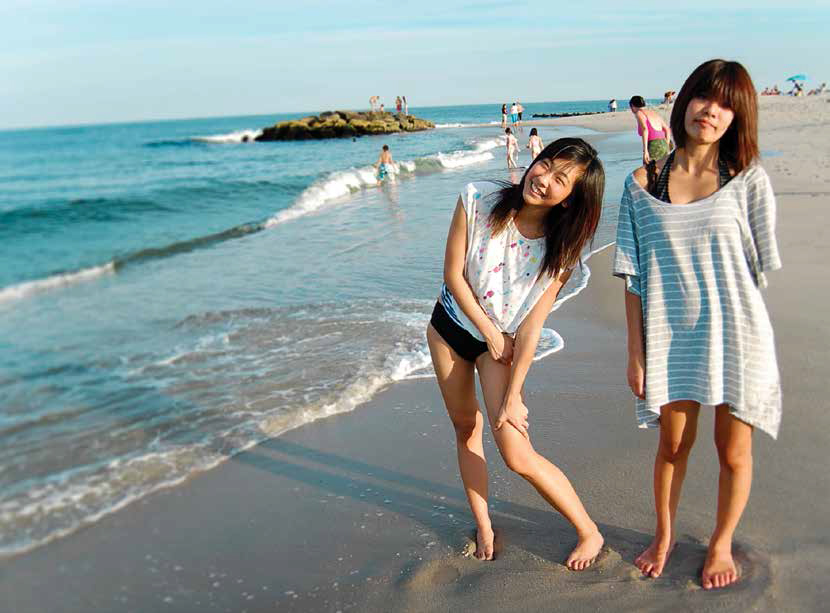In a country setting the trends across Asia, foreigner-only casinos are looking woefully antiquated. That’s set to change from 2017 as the first of several South Korean integrated resorts comes online. Then, at last, the industry can properly capitalize on hallyu, the Korean cultural wave that’s driving dizzying growth in Chinese visitation
South Korea’s 16 foreigner-only casinos are fast becoming an anachronism in a continent increasingly replete with the latest and greatest destination-scale gaming resorts.
The largest and best-known currently operating foreigner-only casino was opened in 1968 at the Sheraton Walker Hill Hotel in the capital, Seoul, one year after the sector was legalized. It’s got 79 tables, twice the average among its peers.
In 2014, foreigner-only casinos generated about 1,378 billion won (US$1.25 billion) in gaming revenue, essentially flat from the year before. To emphasize the sector’s modest size and its potential for growth, observers contrast that figure with Macau’s casino revenue, which last year was 35 times greater, at $43.9 billion. It’s a sensationalistic comparison, but there is perhaps some merit in making it because the two markets aren’t as different as they appear at first glance.
Macau’s casinos, though technically permitted to serve locals, derive a virtually insignificant proportion of their revenue from them. The bulk of the take at both Macau’s casinos and Korea’s foreigneronly venues is supplied by players from mainland China. The split between VIP and mass market is also fairly similar across the two markets. There’s a big difference in capacity, though, with about 620 gaming tables across Korea’s foreigner-only sector, versus 5,700 tables in Macau, making a pound-for-pound comparison between the two markets more meaningful than a top-line revenue comparison: the average Macau table generated $7.7 million last year, close to four times the yield of the average Korean foreigner-only table, which made $2 million.
The two markets have different catchment areas, but that doesn’t seem to explain the gap. Macau, situated on China’s affluent southern coast, benefits from its proximity to the wealthy residents of Guangdong province. South Korea’s foreigner-only casinos, meanwhile, enjoy an exclusive position in northeast Asia, providing the closest legal gaming tables to not only wealthy northern Chinese, including residents of Beijing and Shanghai, but also to Japanese. There is arguably sufficient demand in Korea’s neighborhood to support a casino industry with a capacity close to that of Macau’s, even if the ban on domestic play remains in place.
Not “Real” Casinos
As capacity increases, yields generally drop—in economic theory it’s known as the law of diminishing returns. The reason an average table yields so much more in Macau than in Korea is the two markets don’t offer comparable products. Over the past decade, lavishly appointed resorts unveiled in Macau, Singapore and, most recently, the Philippines, have drastically altered regional gamblers’ expectations of a casino experience. As JP Morgan analyst DS Kim puts it, Korea currently lacks “’real casinos’—that are of comparable scale and quality and have similar offerings as those in other markets—to appeal as a destination to gamblers in the region.”

The Korean government first resolved to address this shortfall back in 2011 with plans to approve the development of a number of integrated resorts with foreigner-only casinos. The first project to get the go-ahead was a joint venture between the country’s leading foreigner-only casino operator, Paradise Group, and Japanese gaming machine manufacturer Sega Sammy Holdings. The resort, dubbed Paradise City, is located in a special economic development zone on Yeongjong island, the site of Incheon International Airport, the main gateway for foreign arrivals, located about 30 kilometers from Seoul. Groundbreaking took place in November with an anticipated 2017 opening at an initial cost of US$750 million.
Korea’s foreigner-only casino market will remain constrained ahead of the new integrated resorts coming online from 2017 onwards. Even then, skeptics such as Seoul-based gaming analystSteve Park at Kore Company argue the country’s new “mini-IRs”
will prove too small to compete regionally. “Korea has a supply of foreigner only casinos already. Would one, two or three more bring more gamers? Would mini-IRs supply the Singapore experience? I doubt it,” he contends. Paradise City, with its initial complement of 160 gaming tables, 388 electronic table games and 350 slot machines, will become by far the country’s largest foreigner-only casino come 2017, but will hardly measure up to the IRs in Macau and Singapore.
There are several bulls, however, including Standard Chartered analyst Philip Tulk, who believes IRs in Incheon will produce a cluster attractive to foreign visitors. A second project already approved on Yeongjong is a similarly priced joint venture led by US casino operator Caesars Entertainment, which plans to break ground this year and open in 2018. Two other ventures could join the cluster come 2019, including one developed by Hong Kong-based retail and property conglomerate Chow Tai Fook Enterprises, and another by the operator of Incheon’s international airport. There’s also a chance they could all morph into more than mini-IRs. At final build-out, most of the proposed Incheon projects have investment targets in the billions of dollars, though clearly, it remains to be seen whether any of them are realized. Even Paradise City envisions doubling its investment in its second phase.

Meanwhile, the government plans to speed the process along by revising investment limits to allow major Korean corporations to participate in the integrated resort industry. Existing rules stipulate that foreign investors must hold at least 51% of such projects before local players can join in. “Now, anybody, including large companies such as Samsung and Hyundai, can participate in the projects through fair competition,” a government official explained.
Another locus of development could be the popular resort island of Jeju, which sits just below the Korean peninsula’s southwestern tip. In February, Genting Singapore, operator of Resorts World Sentosa in Singapore, along with its JV partner Landing International Development Limited, held a ceremonial groundbreaking for their Resorts World Jeju development. As Union Gaming Research Macau analyst Grant Govertsen noted, “While we would typically not get too excited about a ceremonial groundbreaking, we would highlight that the governor of Jeju, Won Hee-Ryong, not only attended the event but also participated in it. Recall that following his election as governor last June, he put the brakes on several projects—gaming and non-gaming—in order to conduct a more comprehensive review of them. We believe this is why the RWJ groundbreaking was postponed for more than half a year. Given the governor’s participation in the groundbreaking event, we believe that: 1) the governor has blessed the RWJ project and it should now be able to move full-speed ahead; and 2) the governor is not as anti-gaming as certain parties have suggested— in fact, we believe he could ultimately be supportive of a small number of high-quality gaming projects in Jeju.”
Mr Govertsen predicts Resorts World Jeju, with an anticipated budget of $1.8 billion and expected to open in phases between 2017 and 2019, “will be right out of the Resorts World Sentosa playbook— theme parks, hotels, entertainment, etc., and all in a low-rise format— but with the addition of residential properties that will (presumably) be marketed to mainland Chinese.”

Paradise Group says it also intends to build an IR in Jeju, where it currently has two casinos.
Jeju ’s Upside Potential
Daiwa Securities analysts Jamie Soo and Adrian Chan don’t believe Resorts World Jeju will be a big earner for Genting Singapore.
“The size of the casino still remains unclear, but we do not expect a significant contribution to earnings since only foreigners are allowed in,” they wrote. “Our previous estimates show that RWJ would add only about 1-2% to Genting’s top line, assuming RWJ earns the average of foreigner-only casinos in Korea.”
Still, there could be potential for the popular volcanic holiday island to surprise on the upside.
Jeju has been particularly welcoming to Chinese visitors,exempting them from visas needed to visit other parts of the country. The Wall Street Journal quotes Willa Wu, a Hangzhou, China, businesswoman who has traveled to Jeju several times, as saying: “The major reason for most people to travel to Jeju is that it’s visafree. And the price for group travel is so cheap.”
Jeju is a one-hour flight from Shanghai and two-and-a-half hours from Beijing. The number of Chinese visitors to the island jumped 58% to 2.9 million last year, almost half the 6.1 million Chinese visitors who descended on South Korea last year.

In another move to jump-start the local economy, local authorities eased investment rules in February 2010, giving permanent residency to foreigners who purchase property worth at least 500 million won ($460,000) in designated districts and who keep them for five years. Since the introduction of the program, more than 1,000 foreigners have used it to apply for residency status, of whom 98% were Chinese nationals.
“Rising tourists and investment from China are helping us raise tax revenue and enhance Jeju’s brand as a global resort destination,” says Kim Nam-sun, a director at the Jeju provincial government.
Union Gaming Research Macau analyst Grant Govertsen is particularly bullish on Jeju’s prospects. He believes the island might even be a better bet for integrated resort developers than Incheon.
“This is not to say that we don’t believe a foreigner-only IR in the greater Seoul (e.g. Incheon) area can’t be successful,” he notes. “However, we feel that the edge might belong to Jeju in the context of it likely being a limited license environment with superior access to Chinese—despite the fact that there are currently eight (very small) casinos in operation.”
Mr Govertsen estimates Resorts World Jeju’s total development cost could be as much as US$1.8 billion, “of which half would, in theory, be attributable to Genting.” He adds, though, that “the net cash cost to Genting could be minimum per management commentary that much of the project cost is expected to be brought down via residential [property] sales.”
The ability to offset some of the investment outlay on Resorts World Jeju through sales of residential properties offers Genting an opportunity to improve the project’s risk/reward profile—an opportunity the developers of multi-billion dollar casinos in Macau’s Cotai resort district have thus far been unable to avail themselves of.
LOSS OF EXCLUSIVITY
Global names of the likes of Las Vegas Sands are also taking a hard look at developing integrated resorts in South Korea, albeit with reservations about the prohibition on domestic play. It’s a validconcern, because the country’s foreigner-only casinos won’t enjoy their exclusive position in northeast Asia for long.
Summit Ascent Holdings, a Hong Kong-listed investment vehicle led by Macau casino billionaire Lawrence Ho, is scheduled to open a casino next month at a planned casino cluster on the outskirts of Vladivostok in Russia’s Far East, squarely within Korea’s catchment area. NagaCorp, operator of the NagaWorld casino resort in the Cambodian capital, Phnom Penh, plans to open another casino within that cluster next year.
Importantly, Japan is also poised to enter the fray—although legalization of casinos there has been held up, there’s still a good chance it will happen this year. That could provide the necessary impetus for the Korean government to allow one or more additional casinos to serve domestic players.
At present, Kangwon Land has the monopoly on locals play. Despite the property’s remote location—an arduous 3.5-hour drive from Seoul—its 200-table casino raked in a little more than the country’s entire foreigner-only sector last year, good for about $6.4 million per table. That yield might not hold up if glitzy new casinos open up in Osaka (1 hour and 40 minutes flying time from Incheon) or Tokyo (2 hours and 15 minutes).
Kangwon Land’s performance at a severely capacity constrained venue points to considerable unserved domestic demand among the relatively affluent 50 million-strong population of the world’s 15th largest economy. It’s probably why many of the companies behind the integrated resorts currently under development or on the drawing board have left so much room to scale up their projects in subsequent phases. Any shift in policy to permit domestic players at casinos other than Kangwon Land would immediately boost the potential returns on larger resort investments.
































